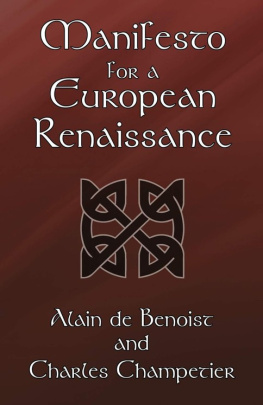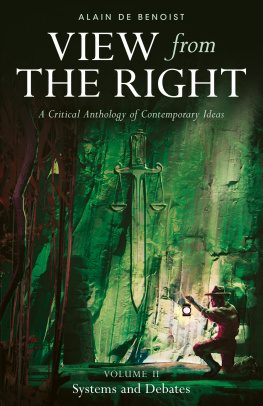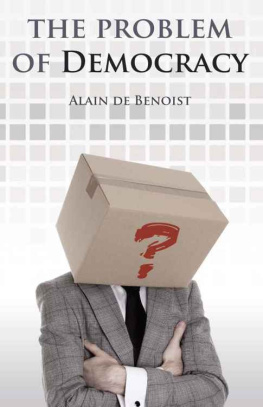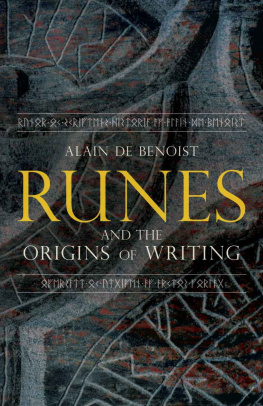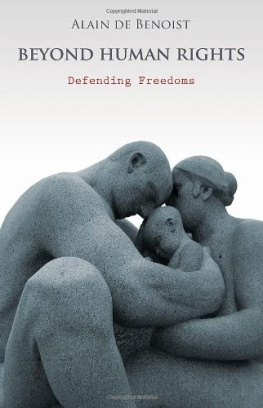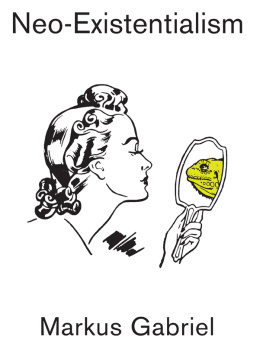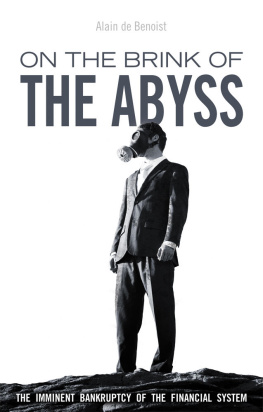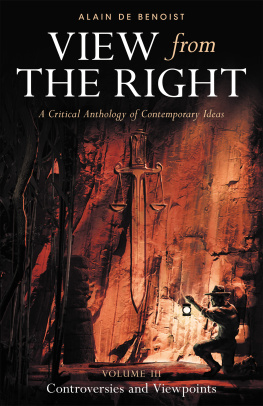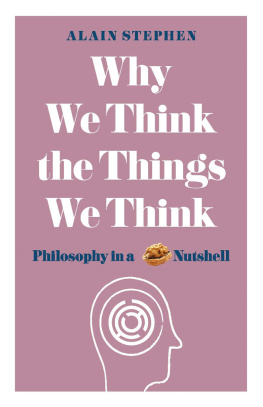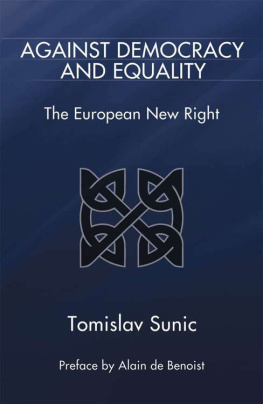Manifesto for a European Renaissance
Manifesto
for a
European Renaissance
Alain de Benoist
and
Charles Champetier
ARKTOS
London 2012
Published in 2012 by Arktos Media Ltd.
2012 Arktos Media Ltd.
No part of this book may be reproduced or utilised in any form or by any means (whether electronic or mechanical), including photocopying, recording or by any information storage and retrieval system, without permission in writing from the publisher.
Printed in the United Kingdom
isbn 978-1-907166-78-5
BIC classification: Social & political philosophy (HPS)
Conservatism and right-of-centre democratic ideologies (JPFM)
Nationalism (JPFN)
Editor: John B. Morgan
Cover Design & Layout: Daniel Friberg
ARKTOS MEDIA LTD
www.arktos.com
Table of Contents
Editors Preface
This manifesto was reprinted by the kind permission of Alain de Benoist. It was originally published in lments 94, February 1999, pp. 11-23, as Manifeste pour une renaissance europenne: la dcouverte du GRECE, Son histoire, ses ides, son organisation. This translation was published in Telos 115, Spring 1999, pp. 117-144, under the title The French New Right in the Year 2000, and is by Martin Bendelow and Francis Greene. Telos was also generous in allowing us to reprint their translation.
GRECE (Groupement de recherche et dtudes pour la civilisation europenne, or Research Group for the Study of European Civilisation) was founded by Alain de Benoist and his colleagues in Paris in 1968 in an effort to revive and redefine certain political and cultural ideas which had been discredited since 1945 as a result of their supposed association with the fascist movements of that era. The term New Right was a moniker which Benoist and his colleagues never applied to themselves, believing that their thought lay outside the traditional categories of what constitutes Left and Right, although they have since come to grudgingly accept it. Benoist, and the then editor of lments , one of GRECEs periodicals, Charles Champetier, collaborated on this work in an effort to assess and summarize the first 30 years in the development of GRECEs thought, as well as to provide some guidance for its future direction at the dawn of the new millennium. It remains the only attempt by GRECE to date to outline the fundamental components of its philosophy. Since 1968 and continuing to the present day, GRECEs influence has spread throughout Europe and across the world.
Readers who wish to learn more about the ideas and history of the European New Right are urged to consult Tomislav Sunics Against Democracy and Equality: The European New Right (London: Arktos, 2011) and Michael OMearas New Culture, New Right: Anti-Liberalism in Postmodern Europe (Bloomington: 1stBooks, 2004).
JOHN B. MORGAN IV
Bangalore, India,
May 2012
Introduction
Th e French New Right was born in 1968. It is not a political movement, but a think-tank and school of thought. For more than thirty years in books and journals, colloquia and conferences, seminars and summer schools, etc. it has attempted to formulate a metapolitical perspective.
Metapolitics is not politics by other means. It is neither a strategy to impose intellectual hegemony, nor an attempt to discredit other possible attitudes or agendas. It rests solely on the premise that ideas play a fundamental role in collective consciousness and, more generally, in human history. Th rough their works, Heraclitus, Aristotle, St. Augustine, St. Th omas Aquinas, Ren Descartes, Immanuel Kant, Adam Smith, and Karl Marx all triggered decisive revolutions, whose impact is still being felt today. History is a result of human will and action, but always within the framework of convictions, beliefs and representations which provide meaning and direction. Th e goal of the French New Right is to contribute to the renewal of these sociohistorical representations.
Even more now, this metapolitical impulse is based on a reflection about the evolution of Western societies in view of the coming Twenty-first century. On the one hand, there is the growing impotence of political parties, unions, governments, classical forms of conquest and the exercise of political power, and, on the other, the rapid obsolescence of all antitheses (first and foremost, Left and Right) that have characterised modernity. Moreover, there is an unprecedented explosion of knowledge, which spreads with little regard for its consequences. In a world where closed entities have given way to interconnected networks with increasingly fuzzy reference points, metapolitical action attempts, beyond political divisions and through a new synthesis, to renew a transversal mode of thought and, ultimately, to study all areas of knowledge in order to propose a coherent worldview. Such has been the aim for over thirty years.
Th is manifesto summarises all of this. Th e first part (Predicaments) provides a critical analysis of the present; the second part (Foundations) outlines a view concerning man and the world. Both are inspired by a multidisciplinary approach that challenges most of todays intellectual antitheses. Tribalism and globalism, nationalism and internationalism, liberalism and Marxism, individualism and collectivism, progressivism and conservatism oppose each other with the same complacent logic of the excluded middle. For a century, these artificial oppositions have occluded what is most essential: the sheer size of a crisis that demands a radical renewal of modes of thought, decision and action. It is thus futile to seek this radical renewal in what has already been written. Yet, the French New Right has borrowed ideas from various theoretical sources. It has not hesitated to reappropriate what seems valuable in all currents of thought. Th is transverse approach has provoked the ire of the guardians of thought, concerned with freezing ideological orthodoxies in order to paralyse any new threatening synthesis.
From the very beginning, the French New Right has brought together people interested in participating in the development of a community. In France, as in other countries, it constitutes a community of work and reflection, whose members are not necessarily intellectuals, but all of whom are interested, in one way or another, in the battle of ideas. Th e third part of this manifesto (Positions) takes positions on current issues, debates and the future of peoples and civilisation.
I. Predicaments
First and foremost, all critical thought attempts to put the age in which it develops in perspective. The present is a pivotal period a turning point or an interregnum , characterised by a major crisis: the end of modernity.
1. What is Modernity?
Modernity designates the political and philosophical movement of the last three centuries of Western history. It is characterised primarily by five converging processes: individualisation , through the destruction of old forms of communal life; massification , through the adoption of standardised behaviour and lifestyles; desacralisation , through the displacement of the great religious narratives by a scientific interpretation of the world; rationalisation , through the domination of instrumental reason, the free market, and technical efficiency; and universalisation , through a planetary extension of a model of society postulated implicitly as the only rational possibility and thus as superior.
Th is movement has old roots. In most respects, it represents a secularisation of ideas and perspectives borrowed from Christian metaphysics, which spread into secular life following a rejection of any transcendent dimension. Actually, one finds in Christianity the seeds of the great mutations that gave birth to the secular ideologies of the first post-revolutionary era. Individualism was already present in the notion of individual salvation and of an intimate and privileged relation between an individual and God that surpasses any relation on Earth. Egalitarianism is rooted in the idea that redemption is equally available to all mankind, since all are endowed with an individual soul whose absolute value is shared by all humanity. Progressivism is born of the idea that history has an absolute beginning and a necessary end, and that it unfolds globally according to a divine plan. Finally, universalism is the natural expression of a religion that claims to manifest a revealed truth which, valid for all men, summons them to conversion. Modern political life itself is founded on secularised theological concepts. Reduced to an opinion among others, today Christianity has unwittingly become the victim of the movement it started. In the history of the West, it became the religion of the way out of religion.
Next page
